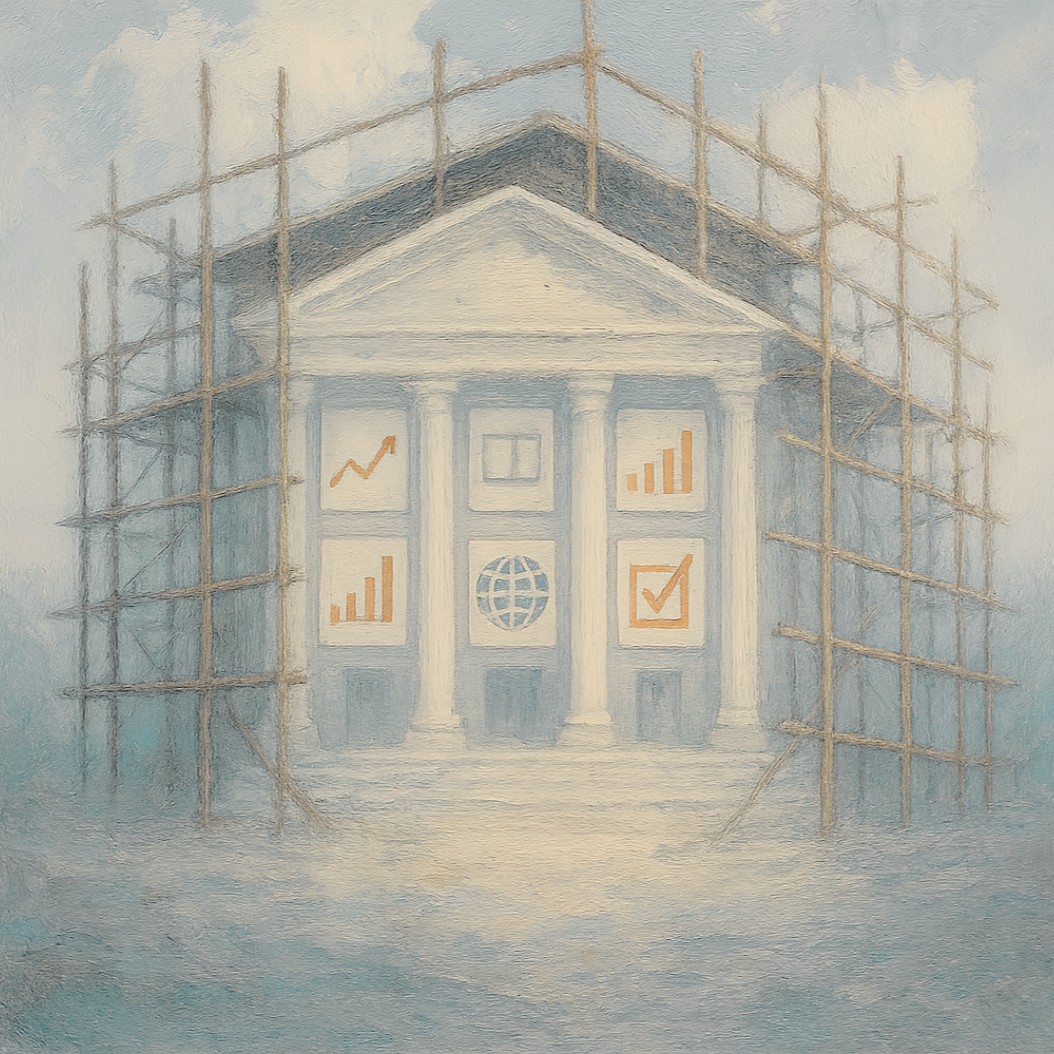
AI development, threats and Norwegian opportunities
Proposals for investments and institutional innovations

Bruk gjerne KI til å skrive tekst, men det er kritisk viktig at det finnes en avsender
I offentligheten er det likegyldig om man får skrivehjelp av en venn, enten vennen er av silisium eller kjøtt og blod.

A golden year for AI
2026 will be a golden moment for artificial intelligence. We should enjoy it while it lasts.

What will happen to the jobs?
Framework for understanding KI's effect on the economy.

Data centers aren't the problem -- poor prioritization is
Data centers are portrayed as a threat to Norwegian industry and the power system. The figures show that the risks lie in unclear frameworks, not in the data centres themselves.

A new project for the state: The baby package
Stewardship of the natural resources and the welfare state are two of our nation's greatest triumphs. What is the next big project for A/S Norway?

Norway needs a new national project
Norway and Europe must find a third way in the shadow of China and the United States.

Here are two suggestions for how the Oil Fund can be run ethically
When we invest in companies that contribute to violations of international law, we profit from the suffering of others. That's not necessarily problematic.

The Ten AI Commandments Link Principles to Politics
The committee's report proposes 44 concrete measures for Norway to build competence, capacity and supervision in the KIC economy.

Preserving the wealth tax is good conservative policy
The wealth tax is an insurance against the greater vulnerability of the tax system, writes Aksel Braanen Sterri in a reply to Eirik Løkke.

Can't we trust the rich?
The country's richest are not fulfilling their part of the societal contract.

Politics for the Future: How to better include the interests of future generations in Norwegian politics
Four proposals for institutional changes. Memo will be published no later than Wednesday, August 25.

The Ethics Council's Impossible Job
The oil fund's ethics council needs to be strengthened considerably. Despite the fact that the council is set to solve an impossible task.

Confessions of a Hypocrite
In the pursuit of tasty proteins, you are responsible for the lives and murders of thousands of animals over the course of a lifetime. Forget your flights, the infidelity, and the cheap products from China. If animals in production have a claim to being treated like the sentient and thinking beings they are, your diet is probably the worst thing you do.

Norway's underwater blind zone
Norway has a moral blind zone underwater. Annually, 200 million farmed salmon die before slaughter, and behind the figure lurks even more lives. Albert Didriksen and Aksel Braanen Sterri from the Norwegian think-tank Langsikt describe ethical challenges in salmon farming.

What's good for Røkke isn't necessarily good for Norway
Stargate Norway is Norway's largest KI venture. Without further action, it will mainly serve Røkke and Altman.

Data Trade Union
We need counterpower in the digital economy. Data unions are the answer.

The Lawlessness of Childhood
Adults are peaceful because we get protection from police and the judiciary. If we want our children to do the same, we need to radically rethink things.

History does not give the answer to how KI will change working life
Generation unemployed is unfortunately a very likely scenario.

Thick or pregnant? Slimming drugs with unexpected side effects.
We need a health system that doesn't just consider one and one treatment.

What do we owe the future?
It may seem obvious that Norway should contribute more to combating climate change. But must Norway always do what is best for the world?

Even the economists don't understand the AI revolution
Our economic institutions are not aligned with the KI revolution -- and the government doesn't know it.

When politicians fall short, the people have the answer
What can make a concrete worker from Brønnøysund, concerned with transport and district policy, become concerned about vaccines in Africa and antibiotic resistance? The answer is participation in a public panel, a democratic innovation that this spring has had its first expressions in Norwegian politics.

Consultation input to the Aquaculture Communication 2025
Here, Long-Term follows its consultation input to Meld. St. 24 on the Future of Aquaculture, where we support the proposal for a loss tax for farmed fish.

Harvard must rediscover its ideals
But the solution does not exist on the right.

Eiendom Norge conference 2025: When and how will artificial intelligence make a difference in society?
Aksel Braanen Sterri gave a talk at Eiendom Norge's conference to talk about artificial intelligence, and what impact we can expect on society.

What if Trump obtains super-intelligent AI?
No one wants China to win the AI race. But how confident are we if Donald Trump's United States comes first to the finish line?

Choose the educations AI can't take away from you!
Here are seven pieces of advice for adolescents -- and parents -- wondering what, and if, they should study in the age of artificial intelligence.

Norway needs more immigration
When Trump sends world-leading scientists on the run, Norway should welcome them with open arms.

Four proposals for a new AI policy
Norway needs a new AI policy.

Norway's war profits should be spent on defending Ukraine
The Oil Fund's "rule of action" is subordinate to peace in Europe. We can no longer allow ourselves to be Europe's Uncle Screw.

Nonsense about weight loss drug
This is the closest we get to a cure for obesity.

Deepseek should be a wake-up call. It's time for Norway to develop its own AI.
Artificial intelligence is too important to be left to oligarchs and party dictatorships.

We are not prepared for the most severe threats
The white paper on total preparedness national security, but we do not know what dangers threaten us or what to do about them.

AI must be democratic and cheap
Last week, the leading AI company Open AI announced that the premium version of the best Chat GPT model will go from costing $20 to $200 a month. So you have to spend 25,000 Norwegian kroner a year if you want the latest technology from Silicon Valley.

Salmon suffering is Norway's darkest secret
... and the government does nothing. Here are four steps that can help with Norway's biggest animal welfare disaster.

Hello, power cable opponents. Can any of you show me where I'm wrong?
High electricity prices are a blessing.

Beneath the Surface: The Animal Welfare Crisis in the Fish Farming Industry

Will the AI growth continue?
The scaling laws that drive AI development.

The Giver Paradox
Why are generous Norwegians so stingy?

The law that drives the development of AI
Anyone who understands AI's scaling laws understands the future.

Here's how Trump could stumble in the race with China
The United States has begun to wake up to the galloping KI developments. The outcome could be a new, cold and digital war with China.

Dumbing down the debate on KI threats
We need more humility from leading voices.

Norwegian companies should set the AI standard
Artificial intelligence (“AI”) has great potential, but the technology and management systems to use the technology are immature. This article provides public and private companies with an overview of the central parts of the risk picture in the face of artificial intelligence and what can be done to address relevant risk factors. This is how Norwegian companies can set the standard for responsible use of AI.

Are our politicians AI skeptics?
Either they ignore the challenges, or they ridicule them.

Even the government can't claim that the electric car subsidies are effective climate policy now
Effective, global climate policy is not outdated. That's the future.

What do we owe the future?
Do we have moral obligations towards people that do not yet exist? In long-term ethics, one is concerned with the future, but what does it really entail?

Dangerously fast in the wrong direction
Creating super-intelligent KI will be humanity's greatest achievement. But will it be the best or worst thing we've created?

Cut electric car subsidies - spend the money out
The electric car subsidies cost too much and seem too little. Replace them with more effective climate action abroad.

The lie behind the rule of action
We don't owe it to posterity to maximise the size of the Oil Fund.
%20(1).jpg)
Oil fund should set the AI standard
The Oil Fund can ensure more responsible AI development.

Should vital health care be put up for auction?
The most important thing we can do to reduce the damage from a new pandemic is to prevent it.

A new pandemic is on the stairs
And it could be much worse than the COVID-19 pandemic.

It shouldn't be up to you to say yes or no to Facebook
Privacy is not protected by focusing more on consent or deleting our profiles.

Standard for Trustworthy Artificial Intelligence
How to manage AI risk? A guide for Norwegian businesses. A collaboration between EY and Langsikt

Constitution needs to be changed
May 17th may not be the day to criticize either the nation or constitution. But it has to be done.

We don't know if private health threatens the welfare state -- lacking data
We don't know how many people buy healthcare privately, who they are, and why they do it. Absence of data is a democratic problem.

Don't stick your head in the sand
Jacob Wulff Wold and Aksel Braanen Sterri respond to criticism from Kjetil Rommetveit and Ragnar Fjelland.

AGI is not futurism
The fact that the problems belong to the future does not mean that we should postpone the discussion of artificial general intelligence until we are in the middle of them.

Input to the National Quality of Life Strategy
Langsikt supports the government's strategy to make the quality of life of the population a guiding star in policy making and use knowledge of quality of life to develop policies that promote quality of life. We thank you for the opportunity to provide input that can make the strategy even better. (NB: The PDF is in Norwegian)

Would you have your personal AI Jonas?
Deepfake technology can be used for more important matters than humor.

Norway First
Insecurity must not cause us to retreat into the snail's house.

Our children, the guinea pigs
If we're going to experiment on schoolchildren we have to do it properly.

Three measures to turn boys into fathers
Measures to help men need to start early.

Norges Bank should set carbon price
If we are to achieve our climate goals, politicians must give up control of the carbon price.

Artificial intelligence: a systematic overview of the risk picture
In this note, we map risks associated with artificial intelligence (AI) and propose solutions. The aim is to form the basis for a more informed conversation about how Norway can help reduce risks and exploit the potential inherent in the technology.

Comments on SV and Venstre's representative proposal on AI
The Centre for Long-Term Policy thanks for the opportunity to give input to SV and Venstre's representative proposals. The main shortcoming in the proposals, we believe, is a more targeted policy to ensure a safe KI development.

Insights into a new national digitalisation strategy
The Centre for Long-Term Policy calls for input on a new national digitalisation strategy from the Ministry of Local Government and the District.

Something is rotten in the EU
Lobbying pressure from German and French companies threatens an essential part of the EU's KI regulation, the authors write in this debate post.

Norway doesn't join the push on AI
What do the United States, Germany, Rwanda and Saudi Arabia have in common? Everyone takes the risks of powerful artificial intelligence (AI) more seriously than Norway.

Three proposals for longer-term policies
The Center for Long-Term Policy presents in this note three proposals for more long-term policies. See the link for the full report.

Ten measures for the new AI minister
Aksel Braanen Sterri at the Centre for Long-Term Policy focuses on artificial intelligence in these advice to Karianne Tung, the government's new minister for digitalisation.

Artificial contradictions
Am I a technology optimist or a prophet of doom? It depends on what day of the week it is, we are to believe the Class Struggle columnists.

Criticism of power does not stand in the way of forward thinking
Debate Posts

We must dare to speculate about both the possibilities and the dangers of AI
The lesson from generative AI is that we must dare to look forward in time and take seriously uncertain scenarios.

Norway needs a technology minister
Despite enormous advances in artificial intelligence, the public sector has not embraced this potentially revolutionary force.

Artificial intelligence is an existential threat
When the world's top experts warn that artificial intelligence could pose a threat on par with pandemics and nuclear war, it's time to listen. A gram of foresight is worth a ton of hindsight. We should act today, rather than regret tomorrow.